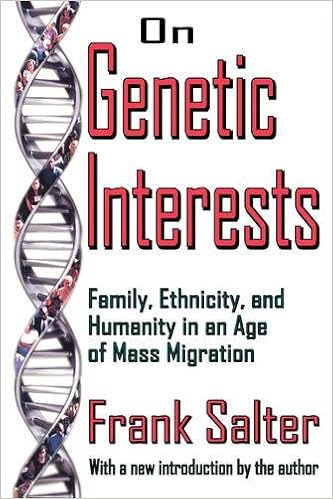"the true strategic threat to both Russia and the United States is China (not the casbah, for God’s sake): the cowboys and the Cossacks should be friends."This makes sense from an American nationalist viewpoint: superpower politics. It also makes long-term strategic sense for Russia, looking at their Siberian border with China.
---
If super-intelligent, incredibly-prosocial and pleasantly-attractive aliens landed in, say, Australia with a view to world colonisation - should we be in favour? They sound nicer than us. Or should we be with Juan Rico: on the bounce and looking out for the interests of the human race, come what may. My species, right or wrong.
 |
| Amazon link |
Frank Salter had a flawed and controversial book, "On Genetic Interests: Family, Ethnicity and Humanity in an Age of Mass Migration", out in 2006 arguing that:
"In modern Darwinian theory, bearing children is only one way to reproduce. Since we share genes with our families, ethnic groups, and the species as a whole, ethnocentrism and humanism can be adaptive."But the average level of relatedness between random members of a genetically-homogeneous nation is about 1/128 (discussion here). This doesn't seem nearly enough to trigger any emotional feelings of kin solidarity, see here.
Nevertheless, there's plainly a measure of emotional solidarity underlying nationalism. It seems to work through shared cultural signifiers (appearance, dress, behaviour, speech patterns, interpersonal style, social conventions and ritual) rather than that you know your co-ethnics at an individual level and feel some nationalistic kin-warmth towards them. That emotional propensity seems also to have been selected for - you don't see it in other animals. It does, however, facilitate the building of empires, which are astonishingly good for your genes.
"But the average level of relatedness between random members of a genetically-homogeneous nation is about 1/128."
ReplyDeleteYour analysis here is simply confused. I recommend that you read Salter and Henry Harpending's 2013 paper, "J.P. Rushton’s theory of ethnic nepotism," and relevant references therein. The gist is that in ethnically diverse contexts, fitness payoffs to investment in ethnic kin are high. From the paper: "Imagine for example that conditions are Malthusian and that one can share a transient surplus with a neighbor, thereby increasing the latter’s individual fitness. If a person can recognize ethnic kin using cultural or heritable markers, he can pick a neighbor with kinship of 0.06 almost every time, corresponding to kinship with a great-grandchild. If at marginal cost he confers some fitness benefit on this neighbor, this is equivalent to increasing his own fitness by 12% (0.06/0.50) of that benefit. On the other hand if he confers the same benefit to a neighbor with kinship 0.06, that decreases his own fitness by the same 12%. Discrimination can therefore cause an action or relationship to yield a 24% difference in fitness."
I suspect you have been misled here by Greg Cochran and the typically misinformed HBD bloggers who uncritically lap up everything he says. At the risk of violating your politeness policy, it must be said that Cochran is a charlatan. His publication record is amazingly thin for someone at his age, and he isn't first author on any of the (small number of) significant biology papers with which he's been involved. He seems merely to attach himself to those with intelligence and good ideas, such as Henry Harpending and John Hawks, and through these connections manages to pass himself off as an original and valuable scientific mind. He isn't -- he's a blowhard who never bothers with quantitative analysis, preferring instead to smugly dismiss any theory or hypothesis he doesn't like with short and poorly considered blog posts.
Thanks for this. Ethnic nationalism is clearly a thing. I find all the cultural/genetic commentary so far (eg "Ultrasociety") less than completely compelling.
DeleteI'm seeing now that something went wrong with my copy-paste. The error is in this sentence: "On the other hand if he confers the same benefit to a neighbor with kinship 0.06, that decreases his own fitness by the same 12%." 0.06 should of course be -0.06, otherwise the central point of the excerpt that I provided is incoherent. In Salter and Harpending's paper, it does read "-0.06," but for some reason, as indicated above, the minus sign was not captured when I copied the article text.
Delete